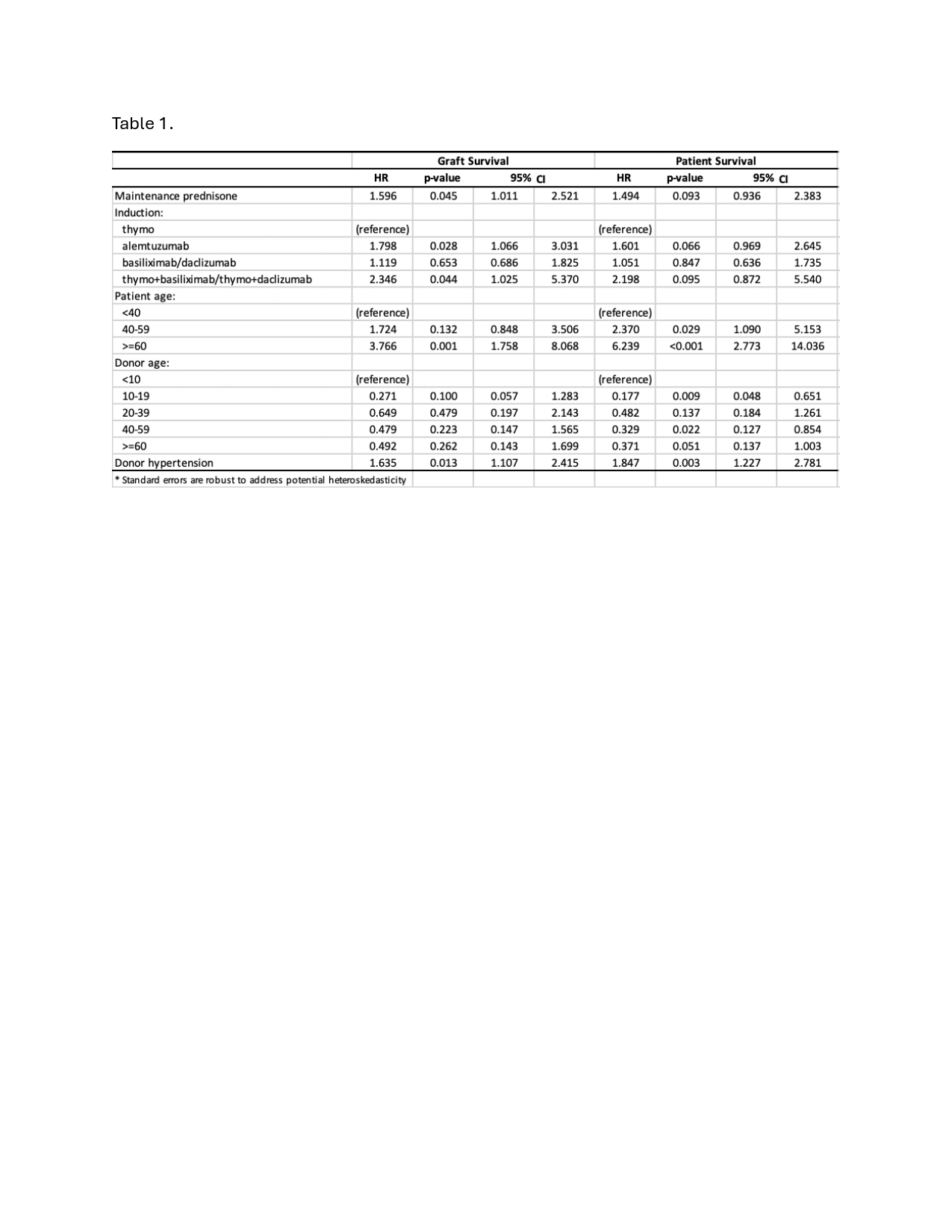Poster Session
Scleroderma
Poster Session A
Session: (0671–0710) Systemic Sclerosis & Related Disorders – Clinical Poster I
0698: A Retrospective Comparison of Transplant Outcomes with Different Induction Methods and Maintenance Prednisone in Systemic Sclerosis Patients
Sunday, October 26, 2025
10:30 AM - 12:30 PM Central Time
Location: Hall F1

Table 1. Hazard ratios for graft and patient survival among systemic sclerosis patients looking at different induction therapies, and maintenance prednisone
- LG
Lilit Grigoryan, DO
Albany Medical College
Albany, New York, United StatesDisclosure(s): No financial relationships with ineligible companies to disclose
Abstract Poster Presenter(s)
Background/Purpose: Systemic sclerosis (SSc) or scleroderma is a rare systemic autoimmune disease with multiple organ involvement. Renal involvement in SSc remains a significant concern, with the most concerning complication being scleroderma renal crisis (SRC). Up to 20-50% of these patients still require long-term dialysis and subsequently kidney transplantation (KT). We performed a retrospective study using the United Network for Organ Sharing (UNOS) database, to compare the impact of different induction immunosuppression regimens and maintenance prednisone amongst our SSc cohort.
Methods: A retrospective analysis was conducted using UNOS database from 2000 to 2022.We had a total of 211 based on diagnostic coding consistent with scleroderma related diagnoses who underwent KT from deceased donors (DD) and live donors (LD). Cox regression analyses were conducted for patient survival and graft survival for patients with SSc. In these models, we excluded interaction terms and KDPI, while including a binary indicator for donor type (live vs. deceased) as well as induction and maintenance therapies. The patients with no induction information were excluded.
Results: There were statistically significant worse outcomes in graft survival in SSc patients receiving induction therapy with alemtuzamab, and thymo+basiliximab/thymo+daclizumab as well as with maintenance prednisone. (Table 1) There was no statistically significant difference in patient survival for both induction therapies and maintenance prednisone, amongst SSc patients. (Table 1)
Conclusion: Different induction therapies in KT are chosen for either their safety profiles or immunosuppressive effects. Alemtuzumab a relatively newer agent, has recently been studied in a retrospective review of 225 SSc patients using data from 2012-2022 which demonstrated significantly poorer graft survival outcomes. This correlates with our findings for poor graft survival among SSc patients receiving alemtuzumab induction. Like alemtuzumab a recent study looked at death-censored graft failure in individuals receiving combination therapy with thymo+basiliximab and found a statistically significant increased rate of death censored graft failure. This observation also aligns with our study.
We further found that maintenance steroid use was associated with poorer graft survival as well. One hypothesis is that steroids may contribute to SRC recurrence after KT. Although the association between steroids and increased SRC risk is well established, data on post-transplant recurrence is limited. A 2005 case study documented two SRC recurrences, with the earlier event occurring in the patient on higher steroid doses. Further research is needed to clarify this potential relationship.

